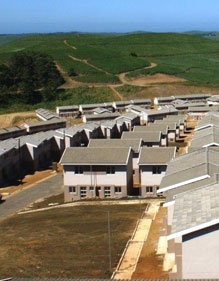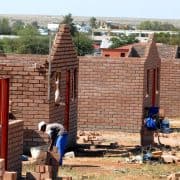|
Getting your Trinity Audio player ready...
|
 In the first part of our three-part housing series we outline some of the corruption-related challenges faced by the national Department of Human Settlements in meeting its mandate.
In the first part of our three-part housing series we outline some of the corruption-related challenges faced by the national Department of Human Settlements in meeting its mandate.
The allocation of RDP houses to people who have registered their names with the government continues to be a challenge for the department of human settlements. This much was conceded by human settlements minister Lindiwe Sisulu in Parliament in July, when she said that some community protests arise as a result of citizens’ anger at the government’s failed promises.
The housing backlog, said Sisulu, is growing as provinces fail to keep up with the demands of providing houses – reasons range from returning to fix poorly-built structures to finding suitable land for new settlements. For the 2.3-million households that wait for the government to catch up with what is arguably its largest project to date, the strategy shared by Sisulu of her department provides hope.
“We have decided that we need to be very focused and deliberate and work twice as hard to make up for the drop in housing delivery,” said Sisulu in her July budget speech. “Our job therefore will be to unblock those pipelines and rev the engine on high voltage. We will deliver not only on the one-million we have promised in the manifesto of the ruling party but make up for the deficit of the last five years. All in all we are committing to 1.5-million housing opportunities in this five year period.”
Sisulu made special mention of military veterans and child-headed households, saying that her department would prioritise their needs.
In this new series we take a closer look at some of the problems that the Department of Human Settlements must address, note what our reporters are alleging about corruption in the system, and examine the allocation policy of the Gauteng provincial government.
Desperate to have a roof over their heads
Corruption Watch is more focused on those citizens who apparently have benefitted from the housing project – as far as local government is concerned. Through the nearly 170 reports of alleged corruption in the housing sector that we have received, we’ve deduced that most complaints about corruption continue to centre on the issue of allocation. Many complainants feel that they have been failed by the department, or their elected public representatives who either overlook the exploitation of the allocation system, or participate in abusing it.
Almost half of those who have reported alleged corruption to Corruption Watch are from Gauteng, with Mpumalanga and Western Cape also featuring significantly. Gauteng’s metropolitan municipality of Ekurhuleni has the most complaints, followed by the cities of Johannesburg and Cape Town.
The most common allegations include :
- houses given to people who are not on the waiting/demand list of the municipality;
- officials from the relevant departments accepting bribes from people wanting to jump the queue;
- local politicians interfering in the process of allocation with/without the knowledge of officials;
- theft of funds reserved for housing developments; and
- people falling outside of the criteria for housing benefits who falsify identity documents to get on the lists.
“My application for a stand was approved in 2004 by the Dept of housing in Daveyton, Zenzele. I have proof of waiting list application receipt,” wrote one of our reporters. “Last year I put someone to look after my stand as I underwent an operation. XXX was the one who was guarding my stand decided to sell my stand. An official from the allocation dpt allocated my stand to Mr YYY. I showed the official my documentation he then said to me give me cold drink which is R1500 I refused. He allocated my stand to YYY because I did not want to provide him cold drink. I reported the matter to the then councillor. She intimidated me and told me to keep quiet. She said the person who took my stand was one of her people.”
Residents taking action against mismanagement
Gauteng’s new MEC of human settlements, Jacob Mamabolo, last month took a hands-on approach to deal with a dispute in the township of Bekkersdal that was attributed to the allocation of houses in a development worth almost R600-million.
SABC News reported that residents took the municipality to the High Court in Johannesburg to stop it from allocating houses to beneficiaries of the Westonaria Borwa Housing Development. The dispute arose because two separate beneficiary lists allegedly exist in relation to the development and before the municipality can start allocating according to its list, the second one should be investigated.
“The municipality, the provincial government and the Greater Westonaria Concerned Residents Association are going to submit the names they have and the names that are in dispute,” Mamabolo was quoted as saying in the report.
“The service provider appointed to conduct the audit will present a reconciled list from the parties and such list will be presented to all the parties. If there’s an agreement from the parties the houses will be immediately allocated.”
In response to Sisulu’s budget address and her department’s plans, DA shadow minister for human settlements Makashule Gana said the inclusion of potential beneficiaries of the housing programme is key to eradicating negative perceptions about government’s delivery.
“If we want recipients of housing opportunities to be active citizens, we should treat them as such,” he said. “We must involve them early on before a house is built or a service is installed. As things stand, recipients have no choice on what kind of house they want.”
In part two we look at the proposed measures that will help to overcome these challenges.







